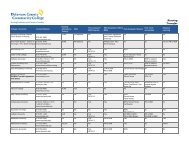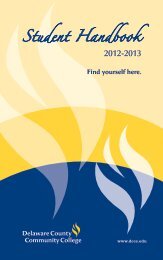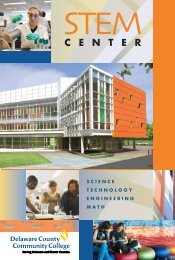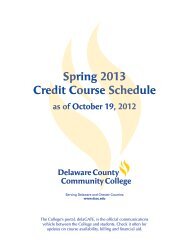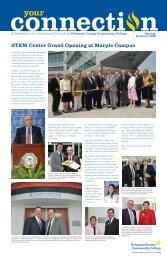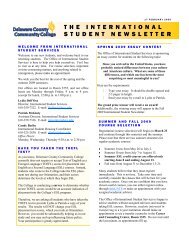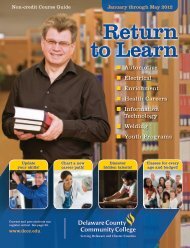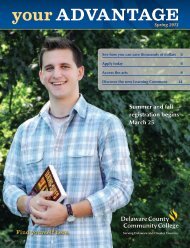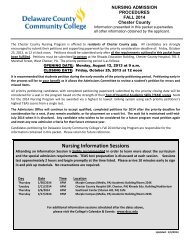2010 Catalog - Delaware County Community College
2010 Catalog - Delaware County Community College
2010 Catalog - Delaware County Community College
You also want an ePaper? Increase the reach of your titles
YUMPU automatically turns print PDFs into web optimized ePapers that Google loves.
134 COURSE DESCRIPTIONS<br />
MAT 121 Modern <strong>College</strong><br />
Mathematics II<br />
This course is similar to Modern <strong>College</strong> Mathematics I<br />
in design and use as a mathematics elective. It may be<br />
taken before Modern <strong>College</strong> Mathetmatics I.<br />
Upon successful completion of this course, students<br />
should be able to:<br />
• Apply techniques and formulas to solve problems<br />
involving permutations and combinations.<br />
• Use the definitions, axioms, and theorems of probability<br />
to solve problems.<br />
• Use statistical measures, graphs, and normality to<br />
analyze a distribution.<br />
• Plus, one of the following competencies:<br />
• Analyze various mathematical systems including the<br />
integers mod m using the cumulative group properties.<br />
• Use the concepts and theorems of elementary number<br />
theory to solve problems.<br />
• Solve problems involving the metric system.<br />
• Use the concepts and formulas of elementary geometry<br />
to solve problems.<br />
• Use the computer to solve problems in the<br />
competencies covered.<br />
Prereq. MAT 060<br />
3 Credits 3 Weekly Lecture Hours<br />
MAT 125 Mathematics for Elementary<br />
Teachers I<br />
This course emphasizes both the clear understanding of<br />
mathematical ideas and, especially, the ability to<br />
communicate these ideas to elementary school children.<br />
Using various mathematical models this course covers<br />
the following topics: sets, whole numbers, numeration,<br />
estimation, number theory, fractions, decimals, integers<br />
and proportions.<br />
Upon successful completion of this course, students<br />
should be able to:<br />
• Utilize the key mathematical processes of communicating,<br />
reasoning, solving problems and making connections.<br />
• Demonstrate an understanding of structure, properties<br />
and operations in the whole number system.<br />
• Utilize mental computation and estimation techniques.<br />
• Demonstrate an understanding of basic number theory<br />
concepts and processes.<br />
• Demonstrate an understanding of structures, properties<br />
and operations in the system of integers.<br />
• Demonstrate an understanding of properties and<br />
operations with fractions.<br />
• Solve problems using ratios, proportions and percents.<br />
Prereq. MAT 060<br />
3 Credits 3 Weekly Lecture Hours<br />
MAT 126 Mathematics for Elementary<br />
Teachers II<br />
As a continuation of Mathematics for Elementary Teachers I,<br />
this course emphasizes both the clear understanding of<br />
mathematical ideas and the ability to communicate these<br />
ideas to elementary school children. Topics include data<br />
analysis, probability, measurement and geometry in two<br />
and three dimensions. This course is designed primarily<br />
for students planning to major in elementary education<br />
but may be elected by other education majors.<br />
Upon successful completion of this course, students<br />
should be able to:<br />
• Collect, organize, analyze and interpret statistical data.<br />
• Solve probability problems.<br />
• Use geometric shapes and patterns to describe real<br />
world phenomena.<br />
• Demonstrate an understanding of the concept of<br />
measurement.<br />
• Use triangle congruence and similarity.<br />
• Analyze lines and circles using coordinate geometry.<br />
• Use transformations to solve geometric problems.<br />
Prereq. MAT 125<br />
3 Credits 3 Weekly Lecture Hours<br />
MAT 130<br />
Finite Mathematics<br />
This course is designed primarily (but not exclusively) for<br />
Business Administration students. Topics include graphing<br />
lines and linear inequalities, solving systems of linear<br />
equations, matrices, linear programming, set theory, probability,<br />
counting principles and applications from management<br />
and economics.<br />
Upon successful completion of this course, students<br />
should be able to:<br />
• Analyze the mathematical properties of lines in the plane.<br />
• Perform operations on matrices.<br />
• Solve 2 x 2 and 3 x 3 systems of linear equations.<br />
• Find the optimal solution of a linear programming<br />
problem using the graphing method for two variables<br />
and the simplex procedure.<br />
• Use the principles of set theory and counting to solve<br />
probability problems.<br />
• Apply the mathematical properties of lines and matrices<br />
to break-even analyses, economic equilibrium problems,<br />
and other business and economic problems.<br />
Prereq. MAT 060<br />
4 Credits 4 Weekly Lecture Hours<br />
MAT 131<br />
Elementary Calculus<br />
This course is designed primarily (but not exclusively)<br />
for Business Administration students. Topics include<br />
functions, limits, differentiation and integration. Applications<br />
include maxima-minima and problems in management<br />
and economics.<br />
Upon successful completion of this course, students<br />
should be able to:<br />
• Solve algebraic problems prerequisite to calculus.<br />
• Take the derivatives of certain algebraic functions and<br />
products, quotients and compositions of such functions.<br />
• Apply the concepts of differential calculus to<br />
optimization problems.<br />
• Graph and take the derivatives of exponential and<br />
logarithmic functions.<br />
• Integrate exponential, certain algebraic functions and<br />
some combinations of these functions using substitution.<br />
Prereq. MAT 130 or MAT 140<br />
4 Credits 4 Weekly Lecture Hours<br />
MAT 135<br />
Business Precalculus<br />
This course is designed primarily (but not exclusively) for<br />
Business Majors. Topics include graphing and solving<br />
problems using linear, quadratic, rational, square foot, log,<br />
and exponential functions, solving systems of equations,<br />
performing operations on matrices, linear programming,<br />
and applications from business and economics.<br />
Upon successful completion of this course, students<br />
should be able to:<br />
• Graph and solve problems using linear, quadratic,<br />
polynomial, rational, and square root functions.<br />
• Graph and solve problems involving the log and<br />
exponential functions.<br />
• Perform operations on matrices.<br />
• Find the optimal solution of a linear programming<br />
problem using the graphing method of two variables.<br />
• Apply the mathematical properties of lines, matrices<br />
and exponential and log functions to business and<br />
economic problems.<br />
Prereq. MAT 100<br />
3 Credits 3 Weekly Lecture Hours<br />
MAT 136<br />
Business Calculus<br />
This course is designed primarily (but not exclusively) for<br />
Business majors. Topics include limits differentiation, and<br />
integration. Applications include maxima-minima and<br />
problems in management and economics.<br />
Upon successful completion of this course, students<br />
should be able to:<br />
• Calculate the derivatives of certain algebraic functions,<br />
and products, quotients and compositions of such functions.<br />
• Apply the concepts of calculus to optimization problems<br />
and consumer and producer surplus.<br />
• Calculate the derivatives of exponential and logarithmic<br />
functions.<br />
• Integrate exponential, certain algebraic functions, and<br />
some combinations of these functions using substitution.<br />
Prereq. MAT 135<br />
3 Credits 3 Weekly Lecture Hours<br />
MAT 140 <strong>College</strong> Algebra and<br />
Trigonometry I<br />
Topics covered in this course are from both <strong>College</strong> Algebra<br />
and Trigonometry and include polynomials, rational<br />
expressions, functions (linear, quadratic, trigonometric)<br />
and theory of equations. This course is intended primarily<br />
for those students who are majoring in science, engineering<br />
or mathematics. Together with <strong>College</strong> Algebra and<br />
Trigonometry I and <strong>College</strong> Algebra and Trigonometry II<br />
(MAT 141), it prepares students for Calculus I (MAT 160).<br />
Upon successful completion of this course, students<br />
should be able to:<br />
• Perform basic operations on real numbers, polynomials,<br />
rational expressions and radicals.<br />
• Solve linear, absolute value, radical, and quadratic<br />
equations and inequalities and radical equations.<br />
• Perform operations in the rectangular coordinator system.<br />
• Define, evaluate and graph functions.<br />
• Solve problems in plane trigonometry.<br />
Prereq. MAT 100<br />
3 Credits 3 Weekly Lecture Hours<br />
MAT 141 <strong>College</strong> Algebra and<br />
Trigonometry II<br />
A course that includes topics from <strong>College</strong> Algebra and<br />
Trigonometry dealing with functions (rational, exponential,<br />
logarithmic, and circular), theory of equations and operations<br />
on complex numbers. This course is a continuation of <strong>College</strong><br />
Algebra and Trigonometry I and primarily intended for<br />
students in science, engineering, and those preparing for<br />
Calculus I.<br />
Upon successful completion of this course, students<br />
should be able to:<br />
• Perform operations involving functions.<br />
• Solve problems involving polynomials and rational functions.<br />
• Solve verbal and non-verbal problems involving logarithmic<br />
exponential, and circular trigonometric functions.<br />
• Simplify algebraic expressions involving complex numbers.<br />
Prereq. MAT 140<br />
3 Credits 3 Weekly Lecture Hours<br />
MAT 150<br />
Precalculus<br />
This course is designed to prepare students for Calculus I.<br />
It includes the study of polynomial, rational, exponential,<br />
logarithmic and trigonometric functions, and the complex<br />
number system. Emphasis is placed on the graphing<br />
of functions.<br />
Upon successful completion of this course, students<br />
should be able to:<br />
• Perform the operations necessary to use polynomial,<br />
rational, exponential, logarithmic and trigonometric<br />
functions in the real-number system.<br />
• Use the polynomial, rational, exponential, logarithmic<br />
and trigonometric functions in the solution of equations,<br />
inequalities and applied problems.<br />
DELAWARE COUNTY COMMUNITY COLLEGE




